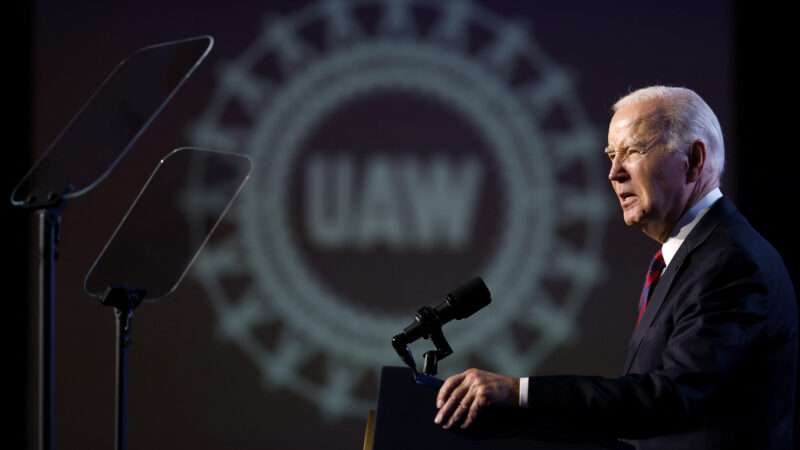
Unions are said to be having a moment. The story goes something like this: Helped by a presidential administration that touts itself as the “most pro-union in history,” labor unions—after decades of decline—are winning big victories against anti-union corporations and extracting impressive concessions for their workers. But is it all true?
There has certainly been a lot of union activity. Last year we witnessed a significant increase in strikes and threats of strikes. According to the Bureau of Labor Statistics, the country lost 16.6 million labor days to work stoppages last year. You have to go all the way back to 2000 to find this level of union disturbance.
In addition, the United Auto Workers (UAW) reached an agreement with Ford that included wage hikes of 25 percent. Similar agreements with Stellantis and General Motors followed. Other unions won contract gains at large employers such as UPS and Hollywood TV and film studios. Then there was the much celebrated UAW victory in a representation election at Volkswagen in Tennessee and progress made at some Starbucks stores.
All the same, talk of a union renaissance might be much ado about nothing. Union membership as a share of wage and salary workers has declined steadily from 28.3 percent in 1967 to an all-time low of 10 percent in 2023. Although the absolute number of union workers has recently risen, it hasn’t kept up with the growth of the total number of American workers.
National Review‘s Dominic Pino has been following unions comprehensively. He never forgets to report both their wins and their losses. For instance, workers at a unionized Nissan facility in Somerset, New Jersey, are in the process of decertifying from the UAW. The same happened at various non-Starbucks coffee shops.
These events are in line with the overall trend for UAW, Pino notes, as “membership declined last year to 370,000. It was nearly 400,000 in 2020, and it peaked at 1.5 million in 1970.” To be fair to the labor movement, part of this decline could be because UAW bosses have been pretty corrupt. For instance, National Review reported that “in December 2020, the UAW reached a settlement with the Department of Justice after a yearslong fraud and corruption investigation. More than a dozen top union officials, including two former presidents, were convicted of crimes for embezzlement of workers’ dues.”
It could also be that unions aren’t so much about fighting for the cause of blue collar workers as they used to be. Indeed, 49 percent of union members worked for the government in 2023. Thirty-three percent of public sector employees are in unions, as opposed to just 6 percent of the private sector. In the case of UAW, about 100,000 members work in higher education, including graduate student workers statistically likely to go on to non–blue collar jobs.
I believe public sector unions shouldn’t exist. Taxpayers—the ones paying the bills when government unions successfully negotiate pay and benefits hikes—are not adequately represented at the negotiation table. In fact, with their political donations, public sector unions help decide who sits on the other end of that negotiating table.
By contrast, private unions have every right to exist, but this doesn’t mean they’re a good thing on net for workers. A September 2023 National Bureau of Economic Research paper looked at what a unionized workforce does to incentives and investment. While unionized plants pay higher wages and benefits than do nonunionized ones, they also “experience higher rates of closure, reduced investment, and slower employment growth.” In other words, your unionized job might pay more, as long as it doesn’t go away—and good luck finding another like it. The result holds also for partially unionized plants.
Introducing more competition to the private sector union business model could help. For that, my colleague Liya Palagashvili suggests ending the exclusive-representation clause that “provides government-granted monopoly status to a union supported by 51 percent of an employer’s workers, giving it the sole authority to negotiate. This means that if some workers want a different union—for example a newer one that might raise the bar in terms of what it can offer—they are out of luck.” Today, these workers aren’t allowed to engage in any negotiations with their employers, and they still have to pay the original union’s fees.
The bottom line is that unions aren’t really going through a renaissance. All things considered, their failure is most workers’ gain.
COPYRIGHT 2024 CREATORS.COM.
The post No, Unions Aren't Having a Resurgence—and That's Good for Workers appeared first on Reason.com.
]]>
In the grand circus of politics, where elephants and donkeys alike perform under the big top, there’s one act that never fails to draw a crowd: the venerable “job creation” routine. Putting people back to work, especially those without college degrees and in the manufacturing world, is in the center ring. Unfortunately, when you look behind the smoke, mirrors, and rabbits hidden in hats, you’ll see that promises to rebuild America through industrial policy are just plain old corporate welfare.
Industrial policy has made an amazing comeback. In its name, President Joe Biden’s administration and Congress have authorized between $1.2 and $2.1 trillion in domestic subsidies for preferred manufacturing industries in sectors such as clean energy, advanced manufacturing, construction, transportation, and broadband. The ringmaster and his assistants assure the crowd that they’ll deliver tens of thousands of new, high-paying jobs for workers with no more than high school diplomas. Meanwhile, on the right, industrial policy is being discussed as a way to boost manufacturing employment for men left behind in the Rust Belt.
The job creation argument for showering businesses with billions more in subsidies might surprise those of you are aware of America’s remarkably low unemployment rate. Indeed, given that handful of people will always be between jobs, a 3.9 percent rate signals that very few who want employment can’t find it.
Instead, what’s animating these politicians is the exodus from the labor force of mostly poorly educated males. The reasons for this workforce withdrawal are complex and beyond the usual scapegoats like trade and market forces. But this topic I will save for another column.
Instead, let’s focus on the reality that industrial policy subsidies and tax breaks will flow to companies, often big and rich, for projects they would likely have taken on anyway. That means they probably won’t create net new jobs. Even if these subsidies were to create a manufacturing boom, it probably wouldn’t lead to an employment boom because most manufacturing output today is produced by robots.
And even if the subsidies benefit workers indirectly, the beneficiaries will be largely college educated and in higher-income groups rather than those working assembly lines. The golden era of widespread, good manufacturing jobs that so many politicians are nostalgic about is over. It’s been going away for 70 years.
So, industrial policy won’t create jobs for poorly educated workers, but it will supercharge cronyism. The Cato Institute’s Chris Edwards notes that Biden’s industrial policy is better described as a corporate welfare bonanza. The Inflation Reduction Act, he writes, “handed out $868 billion in energy subsidies, most of it to big corporations, including automakers, utilities, manufacturers, and hydrogen producers. Adam Michel finds that Biden’s energy tax subsidies could top $1.8 trillion.”
The CHIPs and Science Act of 2022 gave $54 billion in subsidies to a who’s who of corporate and Silicon Valley elite. Ditto with the Infrastructure Investment and Jobs Act of 2021, which subsidized railroads, electric utilities, broadband companies, the electric vehicle industry, and others to the tune of $548 billion.
Unfortunately, when the government is in the business of distributing favors, corporations devote less effort to producing and more to seeking those favors. The result is “unproductive entrepreneurship,” where innovators use their skills to extract government privileges instead of putting new, better, and cheaper goods and services on the market.
Finally, contrary to the anti–big business rhetoric blaring from the Biden administration, it has granted a large amount of narrow corporate tax breaks to big companies. In fact, Edwards finds that since being in power, “President Biden has increased annual average corporate tax expenditures 92 percent from $109 billion to $209 billion.” He notes that tax code expenditures “have increased from $0.3 billion a year projected under Trump to $29 billion a year under Biden.”
Despite the grand promises of revitalizing the American workforce and bringing prosperity to forgotten corners of the country, the reality is that industrial policy is typically a conduit carrying corporate welfare, benefiting the already powerful and wealthy as it discourages genuine innovation and market-driven economic opportunities.
As we peer behind the scenes of this circus act, it becomes clearer that sustainable employment and economic prosperity will be generated not by subsidies but by unleashing market forces, which will promote entrepreneurship and innovation. Only by moving away from the spectacle can we hope to address the challenges underlying the American workforce and pave the way for a more prosperous and inclusive future.
COPYRIGHT 2024 CREATORS.COM.
The post Politicians Are Showering Manufacturing Companies With Crony Subsidies for 'Job Creation.' It Won't Work. appeared first on Reason.com.
]]>
America is celebrated for its economic dynamism and ample and generously paid employment opportunities. It’s a nation that attracts immigrants from around the world. Yet Americans are bummed, and have been for a while. They believe that life was better 40 years ago. And maybe it was on some fronts, but not economically.
Surveys repeatedly demonstrate that Americans view today’s economy in a negative light. Seventy-six percent believe the country is going in the wrong direction. Some polls even show that young people believe they’ll be denied the American dream. Now, that might turn out to be true if Congress continues spending like drunken sailors. But it certainly isn’t true based on a look back in time. By nearly all economic measures, we’re doing much better today than we were in the 1970s and 1980s—a time most nostalgic people revere as a great era.
In a recent article, economist Jeremy Horpedahl looked at generational wealth (all assets minus all debt) and how today’s young people are faring compared to previous generations. His findings are surprising. After all the talk about how Millennials are the poorest or unluckiest generation yet, Horpedahl’s data show them with dramatically more wealth than Gen Xers had at the same age. And this wealth continues to grow.
What about income? A new paper by the American Enterprise Institute’s Kevin Corinth and Federal Reserve Board’s Jeff Larrimore looks at income levels by generation in a variety of ways. They find that each of the past four generations had higher inflation-adjusted incomes than did the previous generation. Further, they find that this trend doesn’t seem to be driven by women entering the workforce.
That last part matters because if you listen to progressives and New Right conservatives, you might get a different story: that today’s higher incomes are only due to the fact that both parents must now work in order for a family to afford a middle-class lifestyle. They claim that supporting a family of four on one income, like many people did back in the ’70s and ’80s, is now impossible. Believing this claim understandably bums people out.
But it’s not true. One of its many problems, in addition to the data evidence provided by Corinth and Larrimore, is that it mistakenly implies that single-income households were the norm. In fact, as early as 1978, 50 percent of married couples were dual earners and just 25.6 percent relied only on a husband’s income. I also assume that there are more dual-income earners now than there were in the ’80s. While this may in fact be true for married couples (61 percent of married parents are now dual-earners), because marriage itself has declined, single-earner families have become relatively more common.
Maybe the overall morosity on the economy has to do with the perception that it’s more expensive to raise a family these days than it used to be. Another report by Angela Rachidi looks at whether the decline in marriage, fertility, and the increase in out-of-wedlock childbirths are the result of economic hardship. She finds that contrary to the prevailing narrative, “household and family-level income show growth in recent decades after accounting for taxes and transfers.” Not only that, but “the costs of raising a family—including housing, childcare, and higher education costs—have not grown so substantially over the past several decades that they indicate an affordability crisis.”
So, what exactly is bumming people out? We may find an answer in the 1984 Ronald Reagan campaign ad commonly known as “Morning in America.” It begins with serene images of an idyllic American landscape waking up to a new day. It features visuals of people going to work, flags waving in front of homes, and ordinary families in peaceful settings. The narrator speaks over these images, detailing improvements in the American condition over the past four years, including job creation, economic growth, and national pride.
I believe this feeling is what people are nostalgic about. It seems that they are nostalgic about a time when America was more united and it was clearer what being American meant. Never mind that this nostalgia is often based on an incomplete and idealized memory of an era that, like ours, was not perfect.
This is a serious challenge that we need to figure out how to address. One thing that won’t help, though, is to erroneously claim that people were economically better off back then and call on government to fix an imaginary problem.
COPYRIGHT 2024 CREATORS.COM.
The post The Economy Is Doing Way Better Than Many Believe appeared first on Reason.com.
]]>
A Florida man accused of facilitating an illegal health care scheme has been spared additional prison time, ending the Justice Department’s attempt to reprosecute him after his sentence was commuted by former President Donald Trump.
Philip Esformes on Thursday pleaded guilty to one count of conspiracy to commit health care fraud and was sentenced to time served, with the federal government agreeing to dismiss the remaining five counts. It’s a quiet conclusion to a controversial prosecution that saw prosecutors resuscitate the criminal case against him not long after he’d spent four and a half years behind bars and was released from prison in December 2020, despite that he had already been sentenced for the same counts on which they sought to retry him.
In 2016, Esformes—who owned a network of skilled nursing and assisted living facilities—was arrested, held without bond in solitary confinement, and charged with over two dozen counts in connection with allegedly bribing doctors to secure patients for his establishments, where the government says he billed Medicare and Medicaid for unnecessary treatments. But while Esformes was convicted on 20 of those counts, including money laundering, the jury deadlocked on six of the most serious charges.
A judge sentenced him, however, as if he’d been convicted of them, in a little-known practice that often offends people’s basic impressions of the protections built into the U.S. criminal justice system. Particularly in federal court, if a defendant receives a split verdict—a conviction on one or some counts, with an acquittal or a hung jury on the remaining charges—a judge may punish them as if they were found guilty of everything.
Esformes’ case was somewhat timely in that “acquitted conduct sentencing,” as it’s typically called, has come under particular scrutiny in recent years. The Supreme Court has previously ruled that judges are permitted to consider counts on which a jury rendered a not guilty verdict, or by extension on which they deadlocked, if he or she decides by a “preponderance of the evidence” that the defendant is, in fact, guilty. That standard of proof is considerably lower than the one employed by juries, which are instructed to convict only if the panel concludes the defendant is guilty beyond a reasonable doubt.
Judge Robert Scola of the U.S. District Court for the Southern District of Florida was explicit that Esformes’ 20-year sentence was in part based on the charges for which a jury did not reach a verdict. (Esformes was also ordered to forfeit $38.7 million and to pay $5.5 million in restitution, which were not absolved with the clemency order handed down by Trump.) “I don’t know what more you are going to get out of the case if you try those additional counts,” he told the prosecution at a restitution hearing in November 2019. There was no utility in a retrial, Scola said, because he had already baked the charges on which a jury hung into the prison sentence he’d given Esformes two months prior.
The federal government agreed. “Certainly, Your Honor, if the case comes back on appeal, we would ask the hung counts to run with the appeal so the whole thing could be retried,” Assistant U.S. Attorney Elizabeth Young responded. “We have entered into agreements to dismiss the hung counts if the defendant’s appeal is dismissed, and we would agree to do so here.”
But after Esformes received clemency in December 2020, the Justice Department reneged on its promise, pledging to retry Esformes on an indictment that isolated the hung counts for which he’d already been sentenced and received a commutation.
The move was not without criticism. “This defendant, as much as you might not like him…do you think he should be punished two or three times for the same conduct?” Brett Tolman, the former U.S. Attorney for the District of Utah and now the executive director of Right on Crime, asked me last year. “I don’t find anybody who thinks that’s fair.” Both Sen. Mike Lee (R–Utah) and Rep. Andy Biggs (R–Ariz.) sent letters urging Attorney General Merrick Garland to change course, accusing his department of politicizing the clemency process. The Subcommittee on Crime and Federal Government Surveillance called a congressional hearing centered around Esformes’ case in June 2023, during which both sides of the political aisle sparred over a “two-tiered system of justice.”
The reaction, however, did not fall entirely neatly along partisan lines. “If you walk through the facts, it’s clearly double jeopardy,” Jessica Jackson, the left-leaning attorney and activist who helped spearhead the advocacy around the landmark FIRST STEP Act, told Reason last year. “The judge on the record at sentencing used the hung conduct as part of his sentence….That sentence was then commuted by President Trump. In my mind, while it’s a novel area of legal precedent, this is double jeopardy by the letter of the law, really.”
The root of the legal issue here—whether or not judges should be able to sentence defendants for crimes they weren’t convicted of—continues to be a subject of intense debate, the climax of which coincided with Esformes’ reprosecution. In June of last year, just over a week after the congressional hearing dedicated to his case, the Supreme Court declined to hear a petition from Dayonta McClinton, who was sentenced to 19 years in prison after he helped rob a CVS Pharmacy. “The driving force” of that sentence, the judge said, was for killing his friend, Malik Perry, after a jury acquitted McClinton of causing that very death.
The post The Justice Department Quietly Ends Reprosecution of Man Who Received Clemency From Trump appeared first on Reason.com.
]]>
Argentina actually elected a libertarian president.
Javier Milei campaigned with a chainsaw, promising to cut the size of government.
Argentina’s leftists had so clogged the country’s economic arteries with regulations that what once was one of the world’s richest countries is now one of the poorest.
Inflation is more than 200 percent.
People save their whole lives—and then find their savings worth nearly nothing.
They got so fed up they did something never done before in modern history: They elected a full-throated libertarian.
Milei understands that government can’t create wealth.
He surprised diplomats at the World Economic Forum this month by saying, “The state is the problem!”
He spoke up for capitalism: “Do not be intimidated by the political caste or by parasites who live off the state…. If you make money, it’s because you offer a better product at a better price, thereby contributing to general well-being. Do not surrender to the advance of the state. The state is not the solution.”
Go, Milei! I wish current American politicians talked that way.
In the West, young people turn socialist. In Argentina, they live under socialist policies. They voted for Milei.
Sixty-nine percent of voters under 25 voted for him. That helped him win by a whopping 3 million votes.
He won promising to reverse “decades of decadence.” He told the Economic Forum, “If measures are adopted that hinder the free functioning of markets, competition, price systems, trade, and ownership of private property, the only possible fate is poverty.”
Right.
Poor countries demonstrate that again and again.
The media say Milei will never pass his reforms, and leftists may yet stop him.
But already, “He was able to repeal rent controls, price controls,” says economist Daniel Di Martino in my new video. He points out that Milei already “eliminated all restrictions on exports and imports, all with one sign of a pen.”
“He can just do that without Congress?” I ask.
“The president of Argentina has a lot more power than the president of the United States.”
Milei also loosened rules limiting where airlines can fly.
“Now [some] air fares are cheaper than bus fares!” says Di Martino.
He scrapped laws that say, “Buy in Argentina.” I point out that America has “Buy America” rules.
“It only makes poor people poorer because it increases costs!” Di Martino replies, “Why shouldn’t Argentinians be able to buy Brazilian pencils or Chilean grapes?”
“To support Argentina,” I push back.
“Guess what?” Says Di Martino, “Not every country is able to produce everything at the lowest cost. Imagine if you had to produce bananas in America.”
Argentina’s leftist governments tried to control pretty much everything.
“The regulations were such that everything not explicitly legal was illegal,” laughs Di Martino. “Now…everything not illegal is legal.”
One government agency Milei demoted was a “Department for Women, Gender and Diversity.” DiMartino says that reminds him of Venezuela’s Vice Ministry for Supreme Social Happiness. “These agencies exist just so government officials can hire their cronies.”
Cutting government jobs and subsidies for interest groups is risky for vote-seeking politicians. There are often riots in countries when politicians cut subsidies. Sometimes politicians get voted out. Or jailed.
“What’s incredible about Milei,” notes Di Martino, “is that he was able to win on the promise of cutting subsidies.”
That is remarkable. Why would Argentinians vote for cuts?
“Argentinians are fed up with the status quo,” replies Di Martino.
Milei is an economist. He named his dogs after Milton Friedman, Murray Rothbard, and Robert Lucas, all libertarian economists.
I point out that most Americans don’t know who those men were.
“The fact that he’s naming his dogs after these famous economists,” replies Di Martino, “shows that he’s really a nerd. It’s a good thing to have an economics nerd president of a country.”
“What can Americans learn from Argentina”
“Keep America prosperous. So we never are in the spot of Argentina in the first place. That requires free markets.”
Yes.
Actually, free markets plus rule of law. When people have those things, prosperity happens.
It’s good that once again, a country may try it.
COPYRIGHT 2024 BY JFS PRODUCTIONS INC.
The post Argentina, Once One of the Richest Countries, Is Now One of the Poorest. Javier Milei Could Help Fix That. appeared first on Reason.com.
]]>
Sen. John Kennedy (R–La.) is upset because Sen. Rand Paul (R–Ky.) wants to limit federal flood insurance.
But Paul is right. In my new video, Paul says, “[It] shouldn’t be for rich people.”
That should be obvious. Actually, federal flood insurance shouldn’t be for anyone. Government has no business offering it. That’s a job for the insurance business.
Of course, when actual insurance businesses, with their own money on the line, checked out what some people wanted them to insure, they said, “Heck no! If you build in a dangerous place, risk your own money!”
Politically connected homeowners who own property on the edges of rivers and oceans didn’t like that. They whined to congressmen, crying, “We can’t get insurance! Do something!”
Craven politicians obliged. Bureaucrats at the Federal Emergency Management Agency even claim they have to issue government insurance because, “There weren’t many affordable options for private flood insurance, especially for people living in high-risk places.”
But that’s the point! A valuable function of private insurance is to warn people away from high-risk places.
But instead of heeding that warning, politicians said, “Don’t worry. Since private companies won’t insure you, we will.”
Of course, the politicians claimed they’d price the insurance properly so they wouldn’t lose taxpayer money.
“We must [do] everything we can to protect taxpayer dollars.” said then-Sen. Wayne Allard (R-Colo.).
But Paul points out, “Like most things in government, they continue to lose money.”
So far, the government lost $36 billion of your money.
Yet they still insure people who can’t get private insurance.
Kennedy thinks that’s fine. “The first role of government is to protect people and property,” he shouts from the Senate floor. “I thought this is what libertarians believe.”
No, Senator, we believe government should protect our right to life, liberty, and the pursuit of happiness, and then leave us mostly alone.
By insuring risky property, Paul points out, “You’re actually doing the opposite of what you would think government would want to do; you’re promoting bad behavior.”
Exactly.
Years ago, federal flood insurance encouraged my bad behavior.
I wanted to build a house on a beach. When I asked my father to help with the mortgage, he said, “No! Are you crazy? It’s on the edge of an ocean!”
Dad was right. It was a dumb place to build. But I built anyway, because federal flood insurance, idiotically, guaranteed that I wouldn’t lose money.
I enjoyed my house for ten years, but then, as predicted, it washed away.
It was an upsetting loss, but thanks to Uncle Sam, I didn’t lose a penny.
I’m grateful. But it’s wrong that you were forced to pay for my beach house.
Paul is right to say that people with second homes “should not get insurance through the government.”
Actually, no one should get flood insurance through the government, but Paul fears that his irresponsible colleagues won’t approve killing the handout altogether. Instead, he just proposes limiting the handout to primary residences.
It would be a start.
But even this slight reform is too much for Kennedy, who says, “If you earn enough to buy a second home, we shouldn’t discourage that.”
No, we shouldn’t.
But we shouldn’t subsidize it with taxpayer money!
Doesn’t he get the difference?
Federal flood insurance is like buying drunk drivers new cars.
Adding to the idiocy, there is no limit on how many times the government will give away your money.
“One home in Virginia,” says Paul, “they’ve rebuilt the house 41 times!”
I took your money once. I apologize for taking it, but when my government offers me a handout, I feel stupid not taking it.
Let’s get rid of federal flood insurance and all subsidies that encourage people to do foolish things.
COPYRIGHT 2024 BY JFS PRODUCTIONS INC.
The post The Feds Shouldn't Subsidize Fancy, Risky Beach Houses appeared first on Reason.com.
]]>
You’ve undoubtedly noticed how up in arms everyone becomes when the government is on the verge of shutting down. I’ve also noticed that the people who most loudly express their horror at the notion of a partial government closure seem totally comfortable with the fiscal wall we are barreling into. That wall is being built, brick by brick, by two political parties that are unwilling to end Washington’s spending debauchery.
This isn’t to deny that some people would have been hurt by the recently averted shutdown (which, by the way, would not have made our debt smaller). It’s a call for consistency from anyone putting their good-government sensibilities on display.
Those sounding the loudest alarms last week are largely silent on the countless occasions when Congress ignores its own budgetary rules. They are rarely outraged when the government is financed with legislation that only expands the balance sheet regardless of whether the money is well spent. All that seems to matter is that government is metaphorically funded, since it usually means growing deficits and explosive debt.
Democrats and Republicans alike engage in fiscal recklessness by passing spending bills they don’t have the first cent to pay for. Politicians who won’t be around to pay the costs shower today’s voters with money that must be repaid by tomorrow’s taxpayers, many of whom aren’t yet born.
They rashly dispense tax credits, loan guarantees, and subsidies to big companies to do what they were going to do without these government-granted favors. The most recent example of this folly is the Inflation Reduction Act, which doled out billions in subsidies to green energy companies for projects most of the recipients had announced months before the bill was passed.
Republicans and Democrats also share in the habit of re-upping subsidies to large agricultural interests, which often raise the price of food. They sneakily bundled those subsidies into a bill that hands out Supplemental Nutrition Assistance Program (SNAP) benefits—popularly known as food stamps—to the tune of $145 billion in 2023 (an increase from $63 billion in 2019).
Beyond the hidden subsidies, the SNAP program is ineffective at lifting families out of poverty. SNAP is designed in ways that likely create disincentives to work. American Enterprise Institute scholars have shown that as many as 71 percent of households receiving food stamps contain no workers and only about 6 percent have a full-time worker. If earning extra money means losing even more in government benefits, many people will understandably choose not to. Ultimately, such a system is bad for recipients and their children, who remain impoverished. Yet it persists because Congress won’t do much about it.
But the worst is of course the bipartisan refusal to reform Social Security, Medicare, and Medicaid. Most of this spending is on autopilot, allowing Congress to repeatedly ignore the problem and others to argue that we should further increase benefits. It’s also the driver of our current and future debt. Where’s the outrage about this fiscal madness? Where are the demands that politicians show us their plans for reform?
One thing’s for sure: These calls aren’t coming from the shutdown alarmists. How many of them write similarly panicky commentaries about how, in about 10 years, Congress’ blatant inaction will lead to across-the-board cuts to entitlement benefits for both the rich and the poor? After all, if legislators decide to borrow more to avoid cuts rather than reforming the programs, it will add another $116 trillion over 30 years to our debt just for Medicare and Medicaid.
Newspapers should be full of reports about how Congress repeatedly fails to perform its core function and avoid this level of fiscal drama altogether. Elected officials should be too embarrassed to show their faces in public. Instead, they can just promise more spending because the real “crisis” is apparently that someone is trying to slam on the brakes—not that there’s a fiscal wall looming ahead.
The federal budget is on a treacherous path and Congress is to blame. Politicians are continuously delinquent on their obligation to be good stewards of our fiscal health, but the “irresponsibility” that most reporters and commentators raise their voices against is the risk of shutdown. These people are upset about the symptoms, not the fatal disease.
The ultimate blame rests on the shoulders of the American people. We routinely elect politicians without care for our fiscal situation. Politicians respond to incentives, and voters mostly signal that we won’t punish them for poor performance. The alarm is ringing. It’s time to wake up, America.
COPYRIGHT 2023 CREATORS.COM.
The post The Real Scandal in Washington Is the Government's Reckless Spending appeared first on Reason.com.
]]>
What may become the most famous mug shot in history is slated to be taken tonight. You’d be forgiven for forgetting why such images are taken in the first place.
That amnesia might be particularly pronounced after the last 24 hours, as a slew of defendants in the Georgia indictment related to allegations that former President Donald Trump and company conspired to overturn the results of the 2020 election have surrendered in Fulton County, Georgia.
Their mug shots have been the center of intense media attention, news articles, commentary, and online mockery, which is odd when considering what a mug shot is, or, rather, what it’s supposed to be: a banal step executed by law enforcement as a record-keeping measure post-arrest.
The fascination with these defendants’ mug shots is a (perhaps counterintuitive) reminder of why the media should decline to publish such photos and why governments should limit their release. That these defendants are in many ways unsympathetic does not change the principle of the matter: that mug shots are not taken to humiliate a defendant before they’ve been convicted of a crime. The events of this week serve as a reminder, however, that that’s the function they serve in wider society.
That’s not to say that the defendants in the Georgia indictment should be held to a different standard than other criminal defendants. It’s the standard itself that needs to change, which will benefit the people who are much less powerful and who stand to lose much more by having their faces splashed across the press before they’ve had a chance to state their case.
It’s an effort that several states across the country have undertaken in various ways. Last year, Louisiana passed a law hamstringing law enforcement’s ability to release certain mug shots pre-conviction for nonviolent crimes, with several exceptions in place for more serious crimes and if the person in question is deemed a fugitive. “Though society may be accustomed to mugshots, the time has come for us to question their social value,” wrote state Rep. Royce Duplessis (D–New Orleans), who filed the legislation, in an op-ed for The Advocate. Several states—including Arkansas, Florida, Montana, New York, and California—have implemented various guardrails against the unfettered access to and publication of mug shots, and the sky is yet to fall.
The circulation of the Georgia defendants’ mug shots may seem like a peculiar hill to die on. They are, after all, some of the most connected people in the country, with support from many Republican partisans nationwide. But it’s that fame that highlights how far the mug shot as a concept has been perverted. I’m willing to venture that the outlets gleefully publishing Rudy Giuliani’s shot already knew what he looked like, and knew most of their dedicated readers did as well. But that wasn’t the point.
One of the paramount constitutional promises in the United States is the notion that you’re innocent until proven otherwise. That applies to the poorest defendants, and it also applies to Trump. When the latter’s mug shot is released, it will almost certainly saturate the airwaves and the web. He’ll bounce back.
Others in his situation, whose names you’ll never hear, might not.
The post Stop Publishing Mug Shots—Even Donald Trump's appeared first on Reason.com.
]]>
The Supreme Court on Wednesday heard arguments in a consequential case. The query before the justices: Was it unconstitutional when the government seized a woman’s home over an unpaid tax bill, sold it for more than the amount of the debt, and then kept the profit?
It may sound like a slam dunk case. Over the last several years, it has not been. But yesterday’s arguments provided both a glimmer of optimism for the state of property rights in the U.S., as well as a glimpse into how far the government will reach to defend its ability to violate those rights.
In 2010, Geraldine Tyler, who was in her early 80s, vacated her condominium in Hennepin County, Minnesota, after a series of local events, including a nearby shooting, left her wanting a safer environment. She was ultimately unable to afford both her new rent and her condo’s property taxes, racking up a $2,300 overdue bill. Local officials added $13,000 in interest, penalties, and assorted fees. They then seized her home, sold it at auction for $40,000, and pocketed the remaining $25,000 surplus.
Multiple federal courts ruled against Tyler, who is now 94 years old, prior to her case’s ascension to the Supreme Court yesterday. “Where state law recognizes no property interest in surplus proceeds from a tax foreclosure-sale conducted after adequate notice to the owner,” wrote Judge Steven Colloton of the U.S. Court of Appeals for the 8th Circuit, “there is no unconstitutional taking.”
That decision came down in February 2022. Christina M. Martin, a senior attorney at the Pacific Legal Foundation, sought to disabuse the high court’s justices of that argument. “The county could have collected the debt without violating the Constitution by following the traditional common law rule still followed in most states and still followed in Minnesota in nearly every other debt collection circumstance,” said Martin, who is representing Tyler. “Under that rule, the county should have taken the property, sold it, paid the debts from the proceeds, and refunded the remainder to Ms. Tyler. Instead, the county took everything.”
It’s a line of thinking the Court appeared receptive to. That became especially apparent when the justices questioned the attorney representing Hennepin County, Neal Katyal, who primarily invoked historical tradition to defend the county’s right to steal Tyler’s home equity.
“Are there any limits on that?” asked Justice Elena Kagan. “Take a $5,000 tax debt and a $5 million house, and the state says, thanks, we’ll keep it.” Katyal danced around the question until Justice Neil Gorsuch demanded a reply: “A $5 property tax, a million dollar property, good to go?” he asked.
Katyal responded that, yes, in effect, that was good to go.
It’s not a hypothetical that requires an active imagination. After Tawanda Hall fell behind on the property taxes for her home in Oakland County, Michigan, the government sold it for more than $300,000, satisfied the tax burden, and kept the profit—which totaled over $286,000. “[I was] running around trying to find out who can I talk to, what can I do to stop this from happening?” she told me in January. “There was really no one there to work with us or help us or even tell us what route to go.”
But it was history that Katyal primarily relied on, citing, among other things, the Statute of Gloucester, which was passed in 1278 by English Parliament. “The Statute of Gloucester was about lands owned by the feudal lord and what happens when a vassal fails to provide enough wheat to his lord and can his lands, which really belong to the lord, escheat to the lord,” said Gorsuch. “And I just don’t understand what on earth any of that history has to do with this case.”
Kagan later echoed that: “If the mind rebels at the notion that the government can seize your $100,000 bank account and not give you back the $90,000 that you don’t owe…why should…what was going on in 1200 or what was going on in 1776 change anything about that?”
Katyal also furnished a 1790 Virginia statute in making his case. When Justice Clarence Thomas inquired as to whether there was any example where it was used in a way similar to Tyler’s, where the government kept the profit, Katyal replied that he had not looked for a formal case in which that had happened.
Of his inability to find a similar case, Thomas later said, “That’s perhaps because [the statute] was never applied in the way that you suggest.”
The core of Katyal’s argument hinged on the idea that Tyler’s property rights were “extinguished” when she fell behind on her taxes. It would seem that, at the least, the justices did not appear moved by that. “There were lots of great questions from the Court today,” said Martin in a statement to Reason. “I hope that the Court will issue a decision holding that it is unconstitutional for the government to take more than it is owed.”
An exchange toward the end of the oral arguments perhaps best epitomized Katyal’s argument and the trouble it faced. Justice Amy Coney Barrett asked if the state would be justified in seizing someone’s car over $20 of unpaid parking tickets. Katyal said no, because there “is no tradition that goes back that could be looked to.”
“Well, there weren’t cars then,” Barrett replied.
The post The Government Stole Her Home Equity Over an Unpaid Tax Bill. Will the Supreme Court Vindicate Her? appeared first on Reason.com.
]]>
When We Are Governed, Ballots Are Best
Affirmative: Jesse Walker

There are countless drawbacks to democratic government, but most of these are problems with the government part, not the democratic part. It is true, as the old joke goes, that unconstrained majority rule is two wolves and a sheep debating what to have for dinner. But unconstrained minority rule is just the same debate with more sheep. The lesson should be that we need constraints on any state, democratic or not.
Constitutional constraints on power are often described as countermajoritarian measures, but the best of them are counterminoritarian too. (The same First Amendment that is there to protect us if Congress passes a law criminalizing speech is also supposed to protect us if an unelected police chief starts harassing his critics.) Democratic input itself can be a constraint on power—not the most effective constraint, but one we’re better off with than without. I prefer it when government does not claim powers over people’s lives; but when it does claim those powers, we should at least get some say in when and how they are wielded.
One possible objection to this is that democracy doesn’t really give us much power: Outside the most local level, it is virtually impossible for one voter’s ballot to change an election’s outcome. This is undeniably true, and I would never try to hector a citizen into the voting booth. But when a large number of citizens get upset at once, that actually can have an impact. Keeping one person from voting is not likely to have a long-term impact on public policy, but systematically barring a population from the polls—as in the Jim Crow South, to give the most obvious example—can allow all sorts of oppressions to thrive.
Another objection is that voters can back bad policies as easily as they can back good ones, as when majorities embrace financially irresponsible measures because they send more money to their pocketbooks. Again, this is undeniably true. But are less democratic systems any better? In his 2004 book For the Many or the Few, the University of Southern California economist John Matsusaka found that ballot initiatives—those direct-democracy routes around the legislature—tend to be associated with reductions, not increases, in spending. The European economists Lars Feld and Gebhard Kirchgässner have found that the cantons of Switzerland, another hotbed of direct democracy, are similarly prone to spending less. And there is no strong evidence that town-meeting governments are more profligate than less democratic municipal structures.
Matsusaka also noted that ballot initiatives tend to be associated with reductions in taxes and with shifts from funding services via taxation to funding them via user fees. And of course, initiatives and referendums have allowed citizens to adopt all sorts of anti-statist measures that legislators were too scared to touch, such as the legalization of recreational marijuana. Within the legislature, meanwhile, libertarian-friendly reform bills have tended to fare better in the more democratic House than in the Senate.
The most intrusive segment of the federal government—the executive branch—contains just two elected officials. Vast swaths of it are shielded from any genuine democratic oversight. In the domestic administrative state, a permanent bureaucracy has been given wide latitude to issue its own rules and to operate its own courts. In the national security agencies, the situation is even worse: A culture of secrecy sometimes conceals even budgets from the public eye, let alone the behavior (and misbehavior) that those budgets are funding. Greater democratic control would not fix the underlying problem here, but it would at least be a potential tool for reining in the abuses. Surely it would be preferable to the status quo.
It may be easy to imagine some idealized elite that would make decisions more wisely than the mass of ill-informed voters, but it’s harder to come up with a foolproof system to establish who is intellectually qualified to join it. (What tool would you use? A literacy test?) And no matter who makes it into that ruling class, it would be just as prone to self-dealing and to interest-group capture as any other system. Undemocratic processes will periodically produce relatively liberty-friendly leaders—a John Cowperthwaite in colonial Hong Kong, a Hans-Adam II in Liechtenstein—but Cowperthwaite is not the typical appointee, and Hans-Adam is not the typical prince. And even those two came to power in tiny polities where it was easier than usual to vote with your feet.
So I’ll muster a cheer for democracy. It is best not to be governed. But when we are, we’re better off with ballots.
Democracy Doesn’t Protect the Individual From the Majority
Negative: Jason Brennan
Compared to dictatorship, one-party states, and oligarchy, democracy is pretty good for freedom. But that’s a bit like saying Karen is the nicest of the Plastics in Mean Girls.
People often describe democracies as free countries and other forms of government as unfree. There are two different, though compatible, reasons why.
As a matter of fact, democracies tend to be more liberal than nondemocracies. Despite being a critic of democracy, I’ve published papers making this point myself. Various think tanks and research centers (such as the Fraser Institute, Economist Intelligence Unit, or Freedom House) produce annual indexes which rate how democratic countries are, how much they respect the rule of law, how much they respect economic liberty, and how much they respect civil liberties (such as freedom of speech). As a matter of fact, there is a very strong and persistent positive correlation between how democratic a country is and how much it respects civil liberty. The effect size is large. There is also a strong and persistent positive correlation between how democratic a country is and how much it respects economic liberty, though here the effect size is much smaller. As countries become less democratic, they tend to become less free.
Still, we should be cautious: Extreme democracy does not predict extreme liberalism. Highly democratic countries tend to be freer than nondemocracies, but that does not mean they are liberal utopias. Democratic countries regularly suppress citizens’ civil rights. They restrict foreign immigration and freedom of movement. Most imposed draconian lockdowns during the pandemic on the basis of flimsy evidence. None respect economic freedom the way libertarians desire.
There seems to be an intimate connection between democracy and freedom, but among researchers the connection is disputed. Some argue that the background conditions which tend to cause liberal politics also tend to produce democratic political structures. Some argue there is causation: Perhaps liberalism causes democracy, democracy causes liberalism, or they are mutually reinforcing. As of now, we don’t really know.
A second reason people claim that democracies are free is that they hold that democratic politics itself is an important kind of freedom, that democracy is essential to freedom, or that the rights to vote, run for office, and participate are themselves constitutive of what it means to be free. These common views do not survive scrutiny.
Back in October 2020, the fast casual restaurant chain Nando’s did a public relations stunt encouraging people to vote. Customers could choose their own meal or instead select an “unDemocratic Meal.” If they selected the unDemocratic Meal, managers would feed them a comical and disgusting mishmash, such as brownies on rice.
Funnily enough, Nando’s other option was a meal where each customer chose for themselves. That’s not democracy; that’s a market. Imagine Nando’s offered a real democratic meal instead: You tell the manager what you want, but then you get whatever the majority wants, regardless of whether you want it. Since you have some input, that’s perhaps better and freer than the UnDemocratic Meal, but it’s not much to celebrate.
When working as intended, democracies give each citizen an equal fundamental share of decision-making power. This is less like equal slices of cake and more like equal crumbs. On the most optimistic estimates in the economics literature, the probability an individual voter will affect the outcome of a major election is, in special cases, somewhere on the order of one in 3 million.
Imagine you were deciding what to eat, whether and with whom to have sex, how to dress, whether and what to worship, where to work, or what rules would govern your life. Imagine we gave you a one in 3 million chance of making these decisions for yourself, along with a 2,999,999 chance that others will decide for you. We wouldn’t call this a situation in which you consent to the outcome, exercise autonomy, live only by rules you set for yourself, or govern yourself. We wouldn’t call it freedom.
Indeed, that’s the very point of democracy. Democracy is not supposed to be a system in which we as individuals decide for ourselves. It’s a system which disempowers individuals in favor of the majority—or the biggest minority. Even members of that very majority are powerless. It’s better to have a vote than not, but an individual vote protects you from the caprice of the majority no more than a bucket protects you from a tsunami.
Subscribers have access to Reason‘s whole May 2023 issue now. These debates and the rest of the issue will be released throughout the month for everyone else. Consider subscribing today!
- Debate: It’s Time for a National Divorce
- Debate: Artificial Intelligence Should Be Regulated
- Debate: Democracy Is the Worst Form of Government Except for All the Others
- Debate: To Preserve Individual Liberty, Government Must Affirmatively Intervene in the Culture War
- Debate: The E.U. Was a Mistake
- Debate: The U.S. Should Increase Funding for the Defense of Ukraine
- Debate: Mentally Ill Homeless People Must Be Locked Up for Public Safety
- Debate: Despite the Welfare State, the U.S. Should Open Its Borders
- Debate: Cats Are More Libertarian Than Dogs
- Debate: Make Housing Affordable by Abolishing Growth Boundaries, Not Ending Density Restrictions
- Debate: Bitcoin Is the Future of Free Exchange
- Debate: Be Optimistic About the World
The post Debate: Democracy Is the Worst Form of Government Except for All the Others appeared first on Reason.com.
]]>